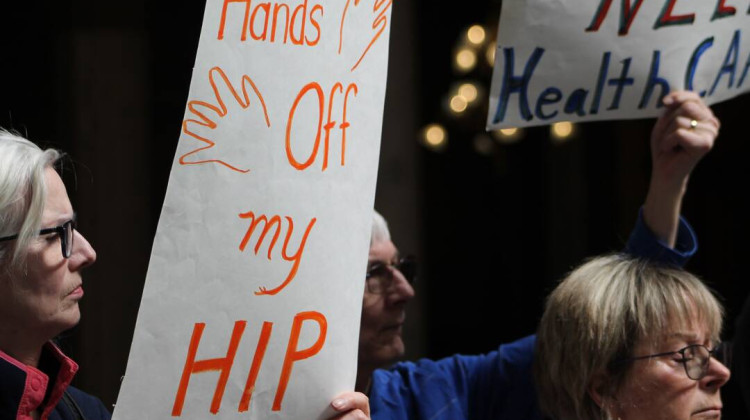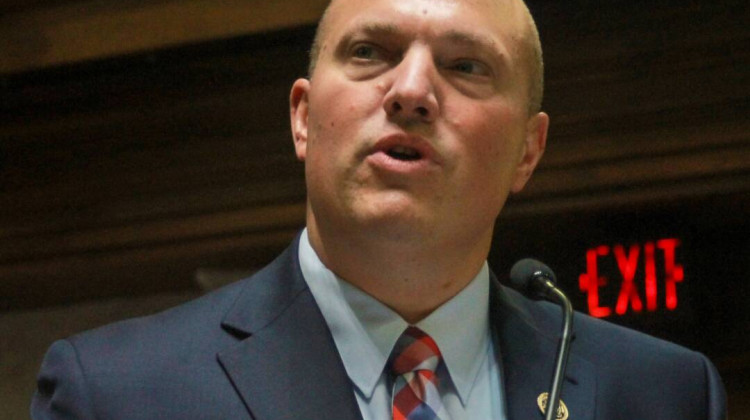
Protesters gather on Monument Circle to protest Indiana's Gateway to Work.
Carter Barrett/Side Effects Public MediaA few dozen people stand on Monument Circle in downtown Indianapolis to protest the state’s new work requirements. “Hoosier healthcare is under attack,” a protester yells through a megaphone. “What do we do? Stand up fight back.”
Starting July 1, tens of thousands of people who receive health insurance through Indiana’s Medicaid expansion are required to report work hours or other activities.
Protesters say low-income people will lose health coverage under the new program known as Gateway to Work. They point to Arkansas, where more than 18,000 people lost coverage after the state implemented a similar program.
The controversy is likely to continue during Indiana’s months-long rollout of Gateway to Work. But Adam Mueller sees a more immediate problem. He’s with Indiana Legal Services, which helps low-income Hoosiers. Although the state has tried to publicize the changes, he's concerned people aren’t aware of their new status.
“The notices that we have seen appear to be very complicated with a lot of language and definitions and terminology that aren't exactly clear,” Mueller says.
He says people might struggle to know if the new program applies to them.
“To the extent that there are efforts to get the word out, it's not clear to me that those have been effective,” Mueller says.
To keep health coverage, an estimated 72,000 people will need to report hours of work or other activity to the state. These new requirements start at 20 hours a month but ramp up to 80 hours a month by July 2020.
Advocates say even the most basic reporting can create problems for people who don’t have reliable access to the Internet or transportation. And that can lead to losing benefits.
National Health Law Program attorney Sarah Somers says there’s been a push in many states for Medicaid work requirements.
“The sort of guiding philosophy behind this was that these are able-bodied people who should be able to work and they shouldn't get health insurance for nothing,” Somers says.
The National Health Law Program has sued to block some of these changes in other states. In March, a federal judge struck down work requirements in Arkansas and Kentucky.
However, comparing those state programs to Indiana’s isn’t straightforward. Hoosiers will have more flexible reporting requirements as well as a long rollout.
“At the heart of this is a debate about does health insurance keep you healthy so you can work, or do you need to work to get health insurance,” Somers says.
Covering Kids and Families helps people navigate Medicaid and other state health care programs. Spokesperson Mark Fairchild says the non-profit hasn’t received many questions about the new requirements.
“We haven't been having dozens of calls each day where consumers have said they're confused, or they don't know what to do, or should they participate?” Fairchild says. “In a lot of ways, we're hoping that's a good thing, but in some ways that can be concerning too.”
Indiana officials say data shows a majority of people affected by the new requirements are aware of Gateway to Work. Fairchild says that’s a good place to start.
He adds, “That's a long distance from knowing exactly how to do it, signing into the reporting portal and understanding those things. But again, until these things are fully implemented, it's always premature to assume everybody has 100 percent of the knowledge they need.”
He says there’s been a lot done to create partnerships with libraries and community colleges to connect people with volunteer, educational or employment opportunities -- all ways to meet Indiana’s work requirement.
Family and Social Services Secretary Jennifer Walthall says the state doesn’t want anyone to lose health coverage because of reporting rules. Since February, the agency has sent out letters, postcards and emails to its members to notify them of changes.
“We’re not going to lose people because of a reporting requirement or an administrative burden or something along those lines because we’ve built a really intuitive, easy program,” Walthall says. “The reporting is not the part that we care about.”
She says the new program is more about connecting people with job training, education or similar programs. Monthly reporting won’t require signatures, paperwork or pay stubs -- the state will trust that participants are honest.
“We’re not trying to make this a full-time job, we’re actually trying to help people get real full-time jobs,” Walthall says. “So we don’t want to get in their way.”
The earliest someone could lose health coverage for not meeting the new requirements is in January 2020.
This story was produced by Side Effects Public Media, a news collaborative covering public health.
 DONATE
DONATE








 Support WFYI. We can't do it without you.
Support WFYI. We can't do it without you.